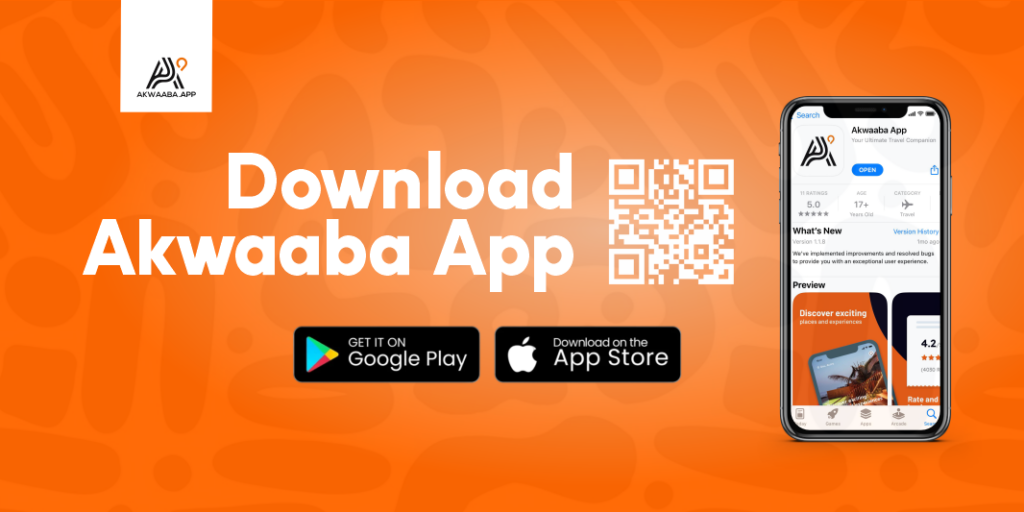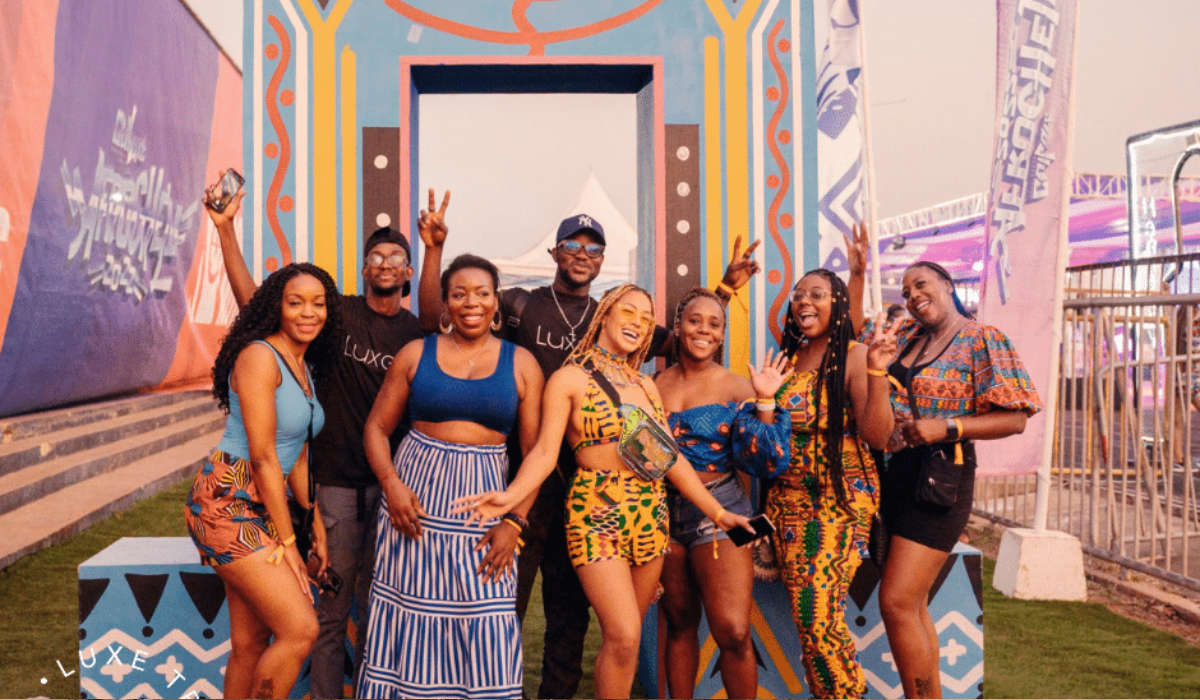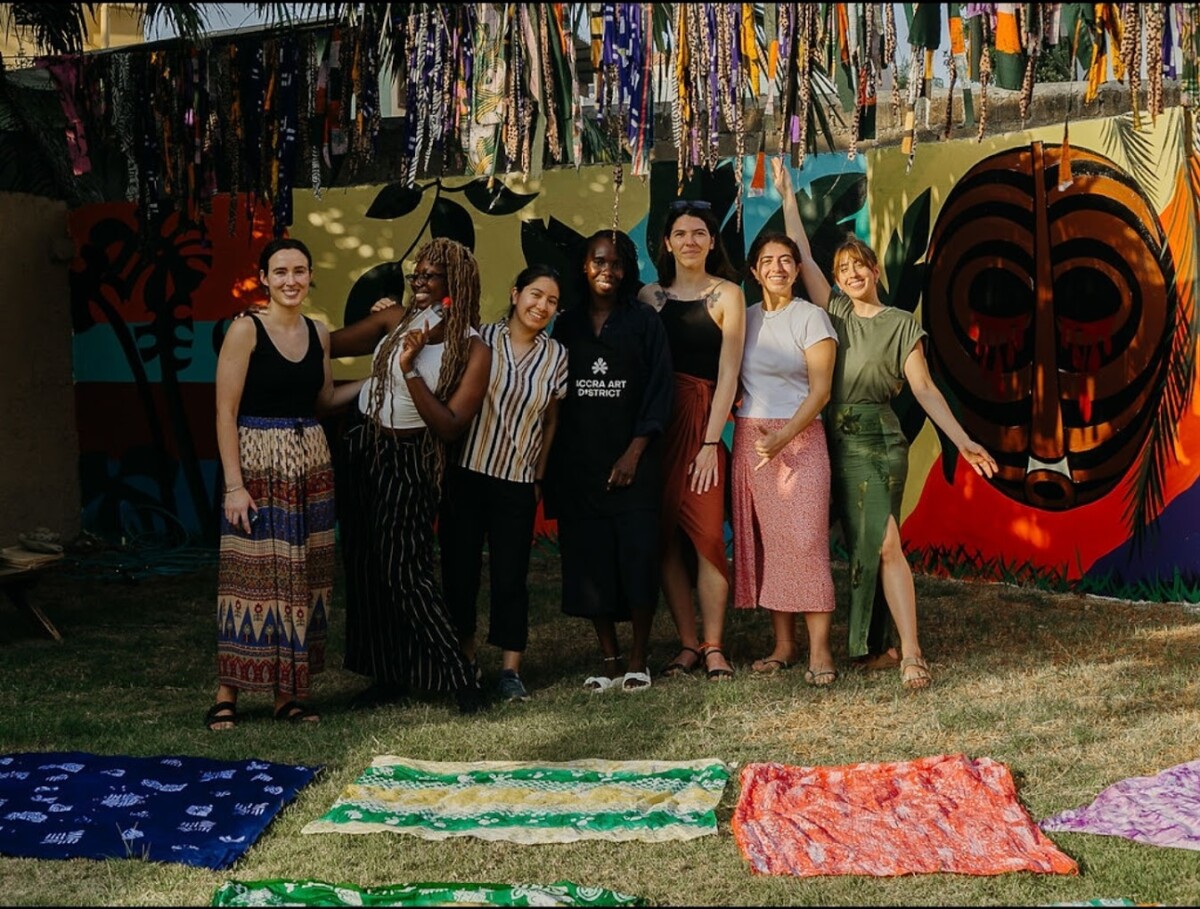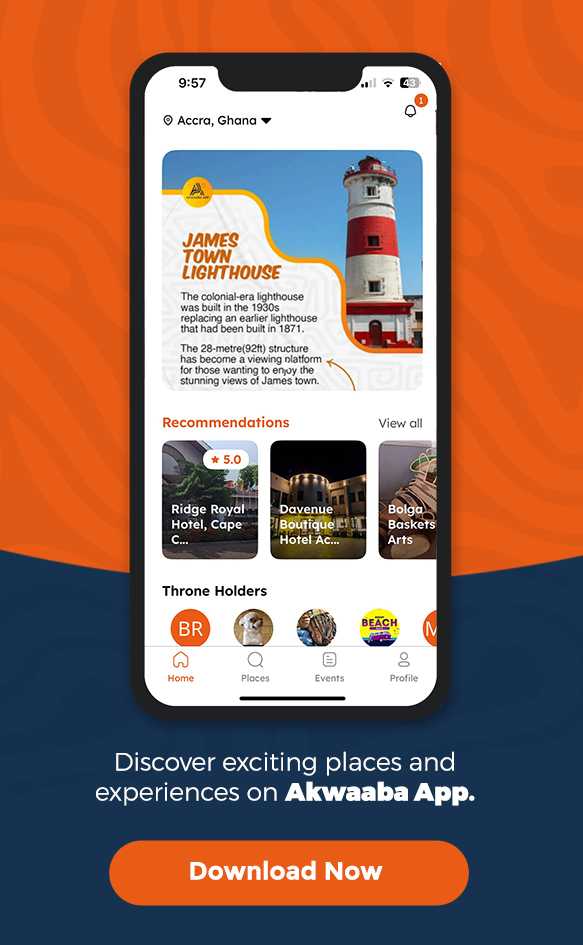Homowo is an annual festival that is celebrated by the Ga people of Ghana, particularly those living in the Greater Accra Region. All Ga communities celebrate the festival, with Gamashie hosting the grandest celebrations. During the festival, maize is planted, which is then used to create Kpokpoi (or Kpekple)—a special dish. It is served with palm nut soup and sprinkled throughout the town by traditional leaders and family heads. There is a strict prohibition on noise-making during this time since it is believed to disturb the gods.
Homowo is marked by vibrant cultural displays, including drumming, chanting, face painting, singing, and traditional dances. People of other ethnic groups are welcome to participate in Homowo, despite it being a Ga festival. There is a belief that the Homowo festival is related to the Jewish Passover feast, reflecting ties to ancient lineages and cultural traditions.
Here is A List of Festival in Ghana
What Does Homowo Mean?
“Homowo” means “hooting at hunger” in Ga, symbolizing the Ga people’s triumph over famine and their gratitude for a bountiful harvest. They are resilient and food plays a significant role in their culture.
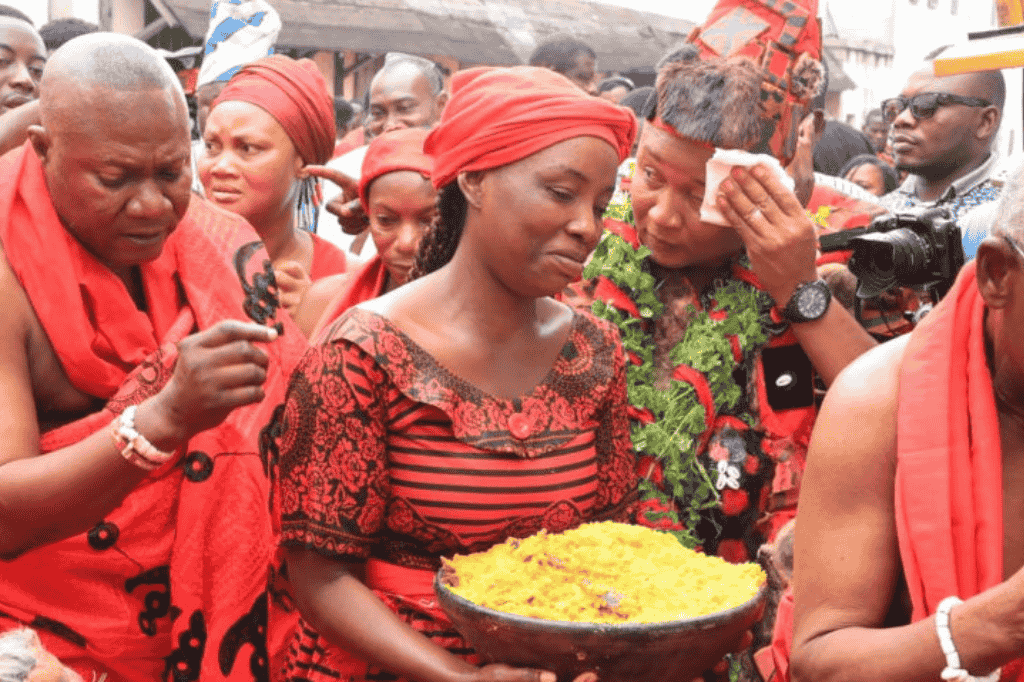
Why is the Homowo Festival Celebrated?
Ga people celebrate Homowo to commemorate their survival during a famine. In history, their ancestors immigrated from Nigeria to Ghana. As they travelled, they encountered severe droughts and hunger. When the rains finally came, and the harvest flourished, they rejoiced and vowed to never forget their hardships. Homowo is celebrated today as a thanksgiving festival, expressing gratitude for food security and prosperity.
The Rich History Behind Homowo Festival
With its roots extending back centuries, the Homowo Festival recounts the migration story of the Ga people to Greater Accra. These resilient people confronted a devastating famine on their journey. In honour of the return of the rains and the flourishing of crops, they celebrated their survival with a feast that has become the foundation of the Homowo Festival.
Ga people celebrate this day every year as a reminder of their victory over hunger. The festival celebrates their gratitude for abundance and commitment to preserving their culture. The core spiritual significance of these celebrations has remained unchanged through the generations.
Ancient roots still inspire modern celebrations. A living bridge between past and present is created when communities gather to perform ancestral rituals. Despite its long history, the festival still plays a major role in the culture and identity of the Ga people.
What Makes the Homowo Festival Special in Ghana?
Honouring Strength Through History
Homowo means “hooting at hunger” in Ga. Originally, the Ga people celebrated this festival to commemorate a time when drought had caused severe famine. Homowo is celebrated to celebrate abundant harvests after overcoming hardship. This is not just about feasting and dancing, this is about honouring the history and resilience of an entire community.
The Famous Kpokpoi
The best part of any festival is the food, and Homowo is no exception. This festival is highlighted by Kpokpoi (or Kpekple), a traditional corn dish served with rich palm nut soup. It’s part of the festival’s rituals, with portions scattered around town in gratitude for the harvest. Every bite carries centuries of history, so food lovers should give it a try!
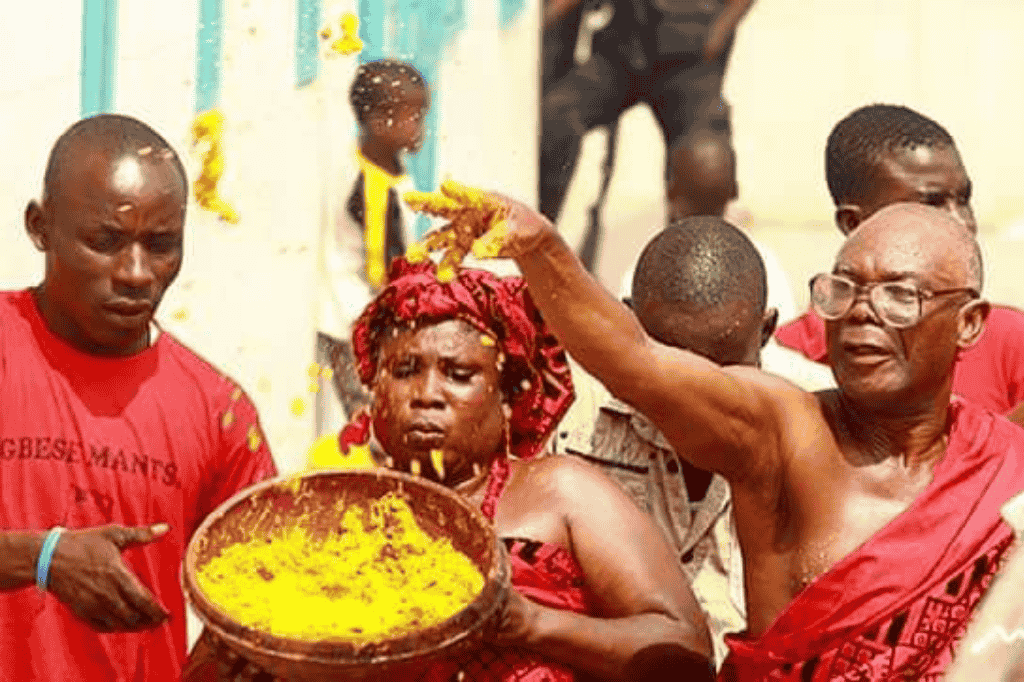
The Sacred Ban on Noise
It is one of the most unique traditions of Homowo that noise is forbidden for one month before the festival. This is a time when drumming, loud music, and festivities stop, allowing the community to reflect, pray, and seek blessings for a fruitful harvest and good rainfall. In this quiet anticipation, the grand celebrations that follow feel even more electrifying! The streets come alive with music, dance, and joy once the silence breaks.
A Festival Across the City
Homowo is a city-wide celebration, not just confined to one location! Each community in Accra holds its own version of the festival, including La, Teshie, Nungua, Osu, Ga-Mashie, and Tema. With unique traditions in every area, visitors can experience Homowo from a variety of perspectives.
Drumming, Dancing, and Colorful Parades
As the festival begins, the streets become a vibrant spectacle of sound and colour. Dancers in vibrant attire perform cultural routines, and chiefs adorned in regal clothing lead energetic processions. It is an unforgettable experience, especially for music- and dance lovers, due to the rhythmic beat of the drums and the spirit of the people.
The Nshobulemo (Yam Ritual)
A traditional priest performs the Nshobulemo, which involves testing new yams before allowing them to be consumed by the general public. During this ritual, the harvest is cleansed to ensure its spiritual purity, and the festival season officially begins.
Importance of the Homowo Festival
Homowo is about more than food and dance. It is a deeply spiritual, cultural, and social phenomenon:
- Preserving Ga Heritage: It gives the Ga people a stronger sense of identity and educates the next generation about their culture.
- Promoting Unity: The festival fosters peace and togetherness among families, clans, and visitors.
- Boosting Tourism and the Economy: Tourists and local businesses benefit from the event, which boosts tourism and local economies.
- Spiritual Significance: The rituals and prayers seek to secure continued prosperity through divine blessings.
Modern Celebrations and Community Impact
It is a beautiful blend of traditional and contemporary elements that makes up today’s Homowo Festival. An electric atmosphere of joy and unity is created by street parades, musical performances, and community gatherings. Using the Akwaaba app, visitors can navigate these events and get real-time updates on locations.
As the festival continues to grow, young people are actively involved in modernizing it while preserving its sacred roots. These traditions are being preserved for future generations through social media coverage and digital documentation. The festival has become a major tourist attraction, boosting local economies and promoting cultural exchange.
Final Thoughts:
Homowo Festival is a vibrant, historical, and culturally rich event that embodies the strength and spirit of the Ga people of Ghana. The colourful processions, feasts, and celebrations of Homowo remain powerful symbols of resilience and gratitude despite its historical roots in famine survival. You can experience Homowo to the fullest using the Akwaaba App, Ghana’s ultimate cultural guide. Get it today and celebrate Homowo in a whole new way!
Frequently Asked Questions (FAQs):
What is the traditional food eaten during Homowo?
Kpekple (or kpokpoi) is a kind of food eaten by the people of Ghana during the celebration of theHomowo festival, which is based on hooting at hunger. This dish includes steamed and fermented corn meal, palm nut soup, and smoked fish as its primary ingredients.
When is Homowo celebrated?
Homowo is an annual festival celebrated between August and September to commemorate a day when hunger was defeated, ridiculed, and hooted.
How long does Homowo last?
In Ghana, the Homowo Festival is a month-long celebration of the harvest that is mainly celebrated by the Ga people of the Greater Accra area. It usually takes place near August, but the exact date is not always determined.
Which people celebrate the Homowo Festival?
The Ga people of Ghana, especially those in Accra, celebrate Homowo. It is one of their most important cultural festivals.
How is the Homowo Festival celebrated?
The Festival is celebrated by planting crops, enforcing a ban on drumming, preparing kpokpoi, holding street processions, dancing, and eating family feasts. Kpokpoi is also sprinkled by Ga chiefs to bless the land.
Why is the Homowo Festival celebrated?
Ga people celebrate the holiday to commemorate how they survived a severe famine and to thank God for food security.


